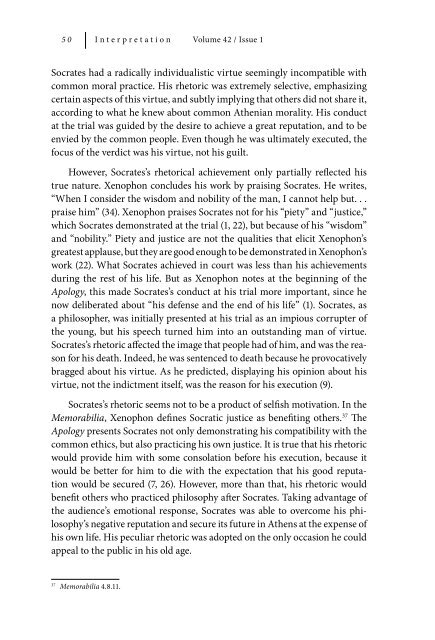Fall 2015
Vol_42_1
Vol_42_1
- No tags were found...
You also want an ePaper? Increase the reach of your titles
YUMPU automatically turns print PDFs into web optimized ePapers that Google loves.
5 0 I n t e r p r e t a t i o n Volume 42 / Issue 1<br />
Socrates had a radically individualistic virtue seemingly incompatible with<br />
common moral practice. His rhetoric was extremely selective, emphasizing<br />
certain aspects of this virtue, and subtly implying that others did not share it,<br />
according to what he knew about common Athenian morality. His conduct<br />
at the trial was guided by the desire to achieve a great reputation, and to be<br />
envied by the common people. Even though he was ultimately executed, the<br />
focus of the verdict was his virtue, not his guilt.<br />
However, Socrates’s rhetorical achievement only partially reflected his<br />
true nature. Xenophon concludes his work by praising Socrates. He writes,<br />
“When I consider the wisdom and nobility of the man, I cannot help but. . .<br />
praise him” (34). Xenophon praises Socrates not for his “piety” and “justice,”<br />
which Socrates demonstrated at the trial (1, 22), but because of his “wisdom”<br />
and “nobility.” Piety and justice are not the qualities that elicit Xenophon’s<br />
greatest applause, but they are good enough to be demonstrated in Xenophon’s<br />
work (22). What Socrates achieved in court was less than his achievements<br />
during the rest of his life. But as Xenophon notes at the beginning of the<br />
Apology, this made Socrates’s conduct at his trial more important, since he<br />
now deliberated about “his defense and the end of his life” (1). Socrates, as<br />
a philosopher, was initially presented at his trial as an impious corrupter of<br />
the young, but his speech turned him into an outstanding man of virtue.<br />
Socrates’s rhetoric affected the image that people had of him, and was the reason<br />
for his death. Indeed, he was sentenced to death because he provocatively<br />
bragged about his virtue. As he predicted, displaying his opinion about his<br />
virtue, not the indictment itself, was the reason for his execution (9).<br />
Socrates’s rhetoric seems not to be a product of selfish motivation. In the<br />
Memorabilia, Xenophon defines Socratic justice as benefiting others. 37 The<br />
Apology presents Socrates not only demonstrating his compatibility with the<br />
common ethics, but also practicing his own justice. It is true that his rhetoric<br />
would provide him with some consolation before his execution, because it<br />
would be better for him to die with the expectation that his good reputation<br />
would be secured (7, 26). However, more than that, his rhetoric would<br />
benefit others who practiced philosophy after Socrates. Taking advantage of<br />
the audience’s emotional response, Socrates was able to overcome his philosophy’s<br />
negative reputation and secure its future in Athens at the expense of<br />
his own life. His peculiar rhetoric was adopted on the only occasion he could<br />
appeal to the public in his old age.<br />
37<br />
Memorabilia 4.8.11.


